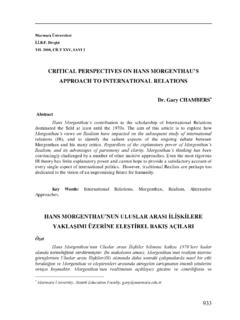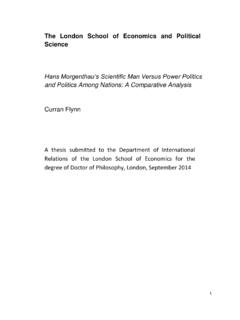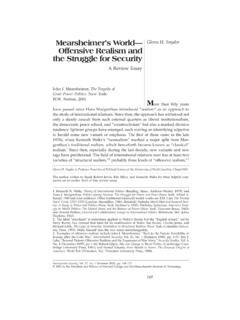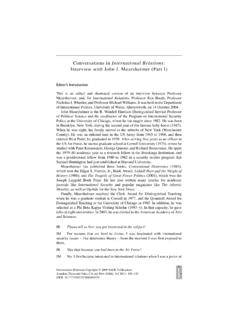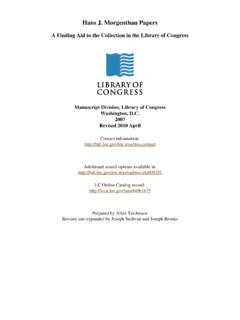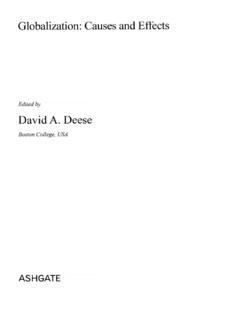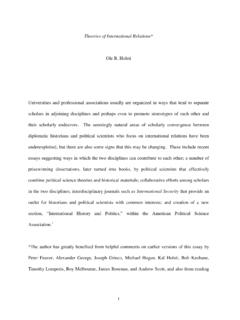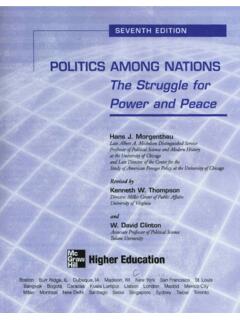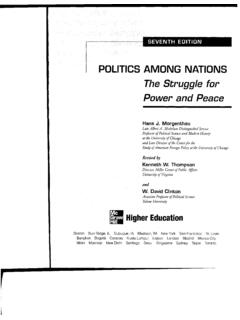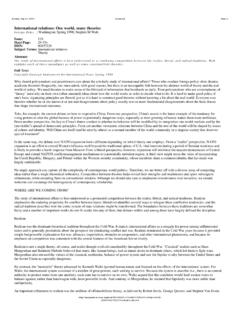Transcription of $ &ULWLTXH 5HYLHZHG ZRUN V - Rochelle Layla Terman
1 7KH $VVXPSWLRQ RI $QDUFK\ LQ ,QWHUQDWLRQDO 5 HODWLRQV 7 KHRU\ $ &ULWLTXH$XWKRU V +HOHQ 0 LOQHU5 HYLHZHG ZRUN V 6 RXUFH 5 HYLHZ RI ,QWHUQDWLRQDO 6 WXGLHV 9RO 1R -DQ SS 3 XEOLVKHG E\ Cambridge University Press6 WDEOH 85/ .$FFHVVHG Your use of the JSTOR archive indicates your acceptance of the Terms & Conditions of Use, available at . is a not-for-profit service that helps scholars, researchers, and students discover, use, and build upon a wide range ofcontent in a trusted digital archive. We use information technology and tools to increase productivity and facilitate new formsof scholarship. For more information about JSTOR, please contact University Press is collaborating with JSTOR to digitize, preserve and extend access to Review ofInternational of International Studies (1991), 17, 67-85 Printed in Great Britain The assumption of anarchy in international relations theory: a critique* HELEN MILNER 'Anarchy is one of the most vague and ambiguous words in language.
2 ' George Cornewall Lewis, In much current theorizing, anarchy has once again been declared to be the fundamental assumption about international politics . Over the last decade, numerous scholars, especially those in the neo-realist tradition, have posited anarchy as the single most important characteristic underlying international relations. This article explores implications of such an assumption. In doing so, it reopens older debates about the nature of international politics . First, I examine various concepts of 'anarchy' employed in the international relations literature. Second, I probe the sharp dichotomy between domestic and international politics that is associated with this assumption. As others have, I question the validity and utility of such a dichotomy.
3 Finally, this article suggests that a more fruitful way to understand the international system is one that combines anarchy and interdependence. Many of the points made in this article have been made individually by other scholars, especially those in the early 1960s such as Inis Claude and James Rosenau. But today these points need to be reiterated, as recent theorizing focuses ever more on anarchy and divorces international politics and domestic ones. It is once again time for a reminder that anarchy is an ambiguous concept and that dangers exist when it is exaggeratedly seen as the central fact of world politics . Critiques of the assumption that international politics is anarchic are not lacking. John Ruggie has argued against Kenneth Waltz's neo-realist theory of the anarchic international system, claiming that it cannot explain change and that it must incorporate other variables?
4 Such as 'dynamic density'?to do Richard Ashley has charged that Waltz's structural model based on anarchy loses sight of politics and of the original insights of the realists; he has also attacked Waltz's For Hayward Alker, the conception of international politics as anarchic presents a * I would like to thank David Baldwin, James Caporaso, Alexander George, Joanne Gowa, Stephan Haggard, Ted Hopf, Robert Jervis, Robert Keohane, Fritz Kratochwil, Kathleen McNamara, Henry Nau, Susan Peterson, Kamal Shehadi, and Jack Snyder for their helpful comments. 1 George Cornewall Lewis, Remarks on the Use and Abuse of Some Political Terms, Facsimile of 1832 text (Columbia, 1970), p. 226. 2 John Ruggie, 'Continuity and Transformation in the World Polity: Toward a Neorealist Synthesis', World politics , 35 (Jan.)
5 , 1982), pp. 261-85. 3 Richard Ashley, 'The Poverty of Neorealism', International Organization, 38 (Spring 1984), pp. 225-86. 67 68 Helen Milner value-laden interpretation of the Despite the criticisms made by these authors, all of them have assumed that anarchy is a well-understood concept. Their attacks have not focused on what IR scholars mean when using the term. Moreover, while these authors have criticized the positivist epistemology used by neo-realists, they have not challenged the claim that the anarchy assumption is fruitful within a positivist research design. This article addresses both of these points. It argues that the notion of anarchy is not so well understood as is commonly implied. It suggests that an emphasis on the assumption of anarchy can be misleading and may have heuristic disadvantages.
6 Even within a positivist framework, this assumption may be degenerative, posing anomalies and inhibiting new insights by separating international politics too radically from other Clarification of this central concept in international relations is important since such a key term should not be used without knowing what is meant by it. Concepts of anarchy Anarchy has been accorded a central role in international politics , especially in recent theoretical writings. Robert Art and Robert Jervis, for instance, assert that 'anarchy is the fundamental fact of international relations.'6 For them, any understanding of international politics must flow from an understanding of this fact. Robert Gilpin defines the fundamental nature of international politics as 'a recurring struggle for wealth and power among independent actors in a state of anarchy/7 For Kenneth Waltz, anarchy is the first element of structure in the international It is for him the structural feature from which all other consequences derive.
7 Recent studies of international cooperation have also started from the assumption that the inter national system is anarchic. Robert Axelrod defines his central question as being 'under what conditions will cooperation emerge in a world of egoists without central authority?'9 He believes anarchy is especially relevant to international politics since 'today nations interact without central authority'.10 The condition of anarchy provides the baseline for his game-theoretic analysis. As he concludes, Today, the most important problems facing humanity are in the area of international relations, where independent, egoistic nations face each other in a state of near anarchy. Many of the problems take the form of an iterated Prisoner's Dilemma." Other scholars have used this analogy between anarchy and the Prisoners' Dilemma as well.
8 In After Hegemony, Robert Keohane begins his effort to explain international cooperation by assuming that anarchy is the fundamental fact about 4 Hayward Alker, 'The Presumption of Anarchy in International Polities', ms., 3 Aug. 1986. 5 The assumption is not progressive in the sense that Lakatos proposes. The propositions it generates do not lead to new questions and their answers. See Imre Lakatos, 'Falsification and the Methodology of Scientific Research Programs', in Lakatos and Musgrave (eds.), Criticism and the Growth of Knowledge (London, 1970). 6 Robert Art and Robert Jervis, International politics , 2nd edition (Boston, 1986), p. 7. 7 Robert Gilpin, War and Change in World politics (Cambridge, University Press, 1981), p. 7. 8 Kenneth Waltz, Theory of International politics (Reading, Mass, 1979), p.
9 88. 9 Robert Axelrod, The Evolution of Cooperation (NY, 1984), p. 3. 10 Axelrod, Evolution, p. 4. 11 Axelrod, Evolution, p. 190. The assumption of anarchy in international relations 69 international politics . He describes the initial international environment as one peopled by egoistic, anomic states, pursuing their self-interests in a self-help system without any centralized authority. He shows that even in this environment, which resembles single-play Prisoners' Dilemma, states can find cooperation to be in their narrow This view of anarchy as the central condition of international politics is also apparent in the explanation of cooperation that emerges in Kenneth Oye's edited volume, Cooperation Under Anarchy. As the title suggests, this volume's fundamental premise about international politics is that it is anarchic.
10 The first sentence of the volume asserts that 'Nations dwell in perpetual anarchy, for no central authority imposes limits on the pursuit of sovereign interests'.13 Moreover, the authors view their central question as being 'what circumstances favor the emergence of co operation under anarchy' and see the structure of the international system as resembling Prisoners' Dilemma. Assuming anarchy to be primary, they then proceed to diagnose what factors make cooperation possible in such an environment. For all of these authors then?although less so for Keohane?anarchy is taken to be the central background condition of international politics . All their analyses flow from this assumption. But what do these authors mean by anarchy? Anarchy has at least two meanings. The first meaning that anarchy carries is a lack of order.



